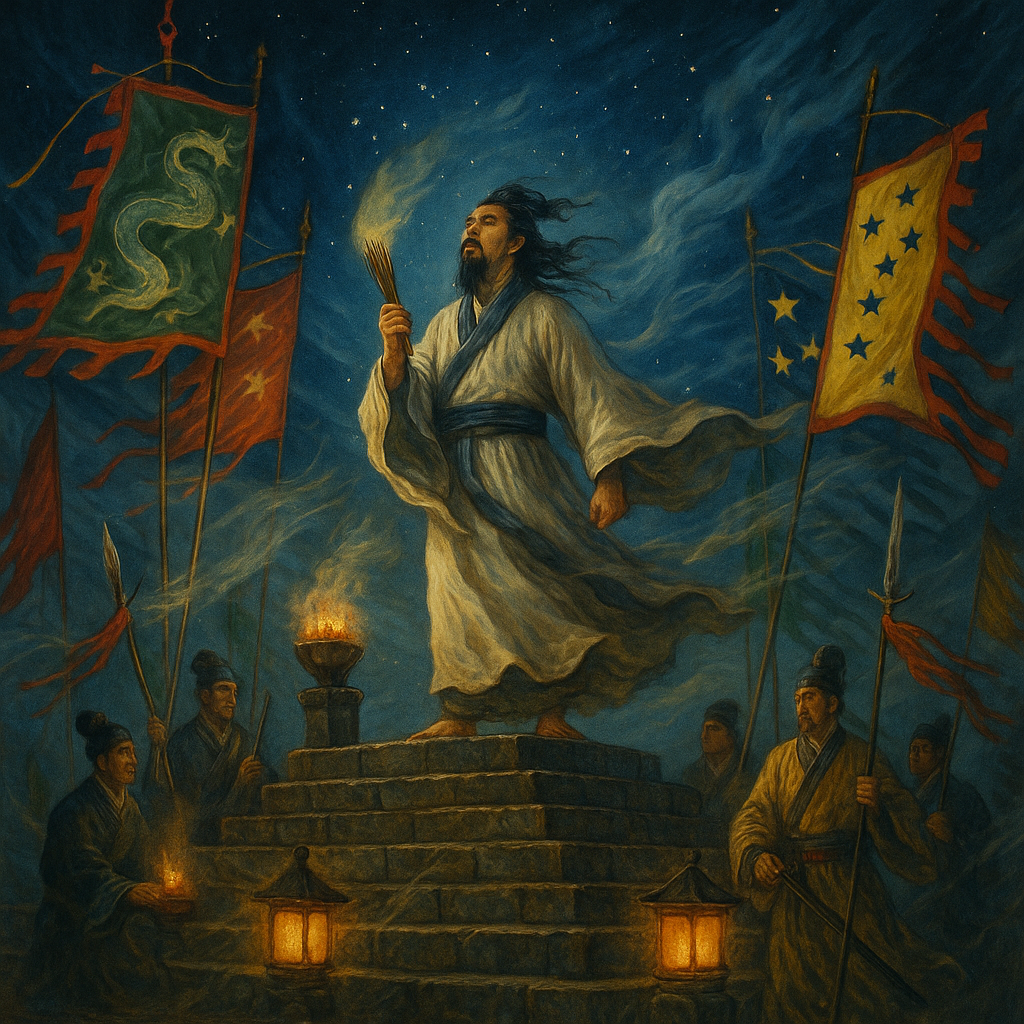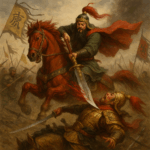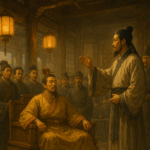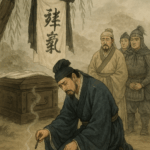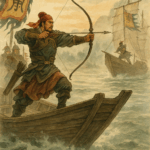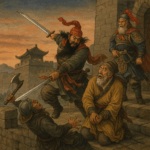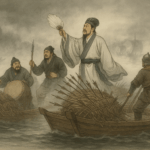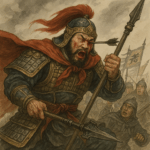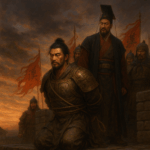Zhou Yu stood atop the hill, watching intently. After a long while, he suddenly staggered backward, spitting fresh blood, and collapsed unconscious. His attendants hurried him back to his pavilion. The generals and officers gathered anxiously, whispering among themselves, “With a million troops north of the river, poised like a crouching tiger ready to devour, how can our Commander survive? If Cao’s forces arrive now, what will we do?” Hastily, a messenger was dispatched to summon Sun Quan and to send for physicians.
Meanwhile, Lu Su, distressed by news of Zhou Yu’s sudden illness, came to see Zhuge Liang. “Our Commander has fallen gravely ill,” he reported. Zhuge Liang asked calmly, “What do you make of it?” Lu Su replied, “This is Cao Cao’s blessing and our ruin.” Zhuge Liang smiled and said, “I may not be talented, but I can cure Gongjin’s malady.” Overjoyed, Lu Su escorted him to Zhou Yu’s pavilion. There, Zhou Yu lay propped up with his head covered. Lu Su greeted him, “How does the Commander feel?” Zhou Yu groaned, “My chest aches, and I faint at intervals.” “What medicine have you taken?” Lu Su asked. Zhou Yu answered, “I’ve tried cooling prescriptions, but they won’t go down—they upset my stomach.” Lu Su said, “Just now I sent for Master Kongming; he claims he can heal you. Shall we let him try?” Zhou Yu nodded, and his attendants helped him sit up.
Zhuge Liang approached and addressed him kindly: “Commander, I have not seen your face for days; I feared your health would suffer.” Zhou Yu sighed, “Misfortune can strike at any moment; who can safeguard against it?” Zhuge Liang replied, “Heaven’s workings are unpredictable; how can humans fathom them?” Zhou Yu paled and groaned. Zhuge Liang gently inquired, “Do you feel blocked qi in your chest?” Zhou Yu admitted, “Yes.” “Then we must regulate your qi,” said Zhuge Liang. “If your qi flows freely, your body will heal itself.” Zhou Yu, catching his meaning, asked, “What remedy accomplishes that?” Zhuge Liang smiled: “I have just the prescription.”
He withdrew to write secretly on paper sixteen characters:
“To break Cao Gong’s strength, fire is the key; all is ready except the East Wind.”
Handing the note to Zhou Yu, he said, “This is the root of your illness.” Zhou Yu’s eyes widened in amazement: “Kongming truly is a wonder! You already know my deepest thoughts—and yet you spoke only the truth.” Laughing, he pressed, “Master, now that you know the cause, what cure do you prescribe? Time is of the essence.” Zhuge Liang replied, “I am unworthy, but I once learned a celestial art that can summon wind and rain. If you wish for a southeast gale, build an altar on Mount Nanping—nine feet tall, in three tiers—manned by one hundred and twenty flagged attendants. I will perform the rite there for three days and nights to borrow the East Wind; what say you?” Zhou Yu exclaimed, “One night of wind will suffice! But we cannot delay.” Zhuge Liang set the date: “On the jiazi day of the eleventh month, we shall pray; by the bingyin day, the wind will cease.” Delighted, Zhou Yu ordered five hundred sturdy soldiers to build the altar and one hundred and twenty to bear the banners and await orders.
Bidding farewell, Zhuge Liang and Lu Su rode to Nanping Hill to survey the terrain. Under his direction, soldiers laid out red earth in a twenty-four-zhang square. Each of the three tiers rose three feet, reaching nine feet high. On the lowest tier, they planted twenty-eight constellation banners: seven azure ones to the east (forming the Azure Dragon), seven black to the north (the Black Tortoise), seven white to the west (the White Tiger), and seven red to the south (the Vermilion Bird). On the second tier, sixty-four yellow flags arranged according to the sixty-four hexagrams circled the platform. Atop the third tier stood four men, crowned and garbed in ceremonial robes, bearing symbols of the ritual: one held a long pole topped with cock’s feathers to beckon the wind; another bore a banner marked with the Big Dipper; the third clasped a sacred sword; the fourth held an incense burner. Around the base, twenty-four more men wielded a variety of standards and weapons, encircling the altar on all sides.
On the auspicious jiazi day of the eleventh month, Zhuge Liang bathed, fasted, donned Taoist vestments, and ascended the altar barefoot, hair loose. He consecrated the space with incense and water, looked skyward, and muttered prayers. He descended periodically to rest and take meals, then returned to repeat the rite three times a day. Yet no wind arose.
Back in camp, Zhou Yu, Chen Pu, Lu Su, and the officers waited for the wind signal to advance. Meanwhile, Huang Gai prepared twenty fire ships—spiked prows bristling with nails, packed inside with reeds, oil, sulfur, and gunpowder, draped in soaked oiled cloth, each marked with a blue dragon banner. Ganning, Kan Ze, Cai He, and Cai Zhong held the water fort, insisting no one set foot ashore. All was ready at the signal.
That night, the moon bright and breeze still, Zhou Yu muttered to Lu Su, “This is nonsense. How can we possibly summon the southeast wind in midwinter?” Lu Su remained confident. Around the third watch, flags began to flutter—first weakly, then violently. The wind had shifted southeast. Zhou Yu, aghast, cried, “This man wields magic against Heaven itself! If we leave him be, he’ll be our undoing. We must kill him tonight!”
He summoned Ding Feng and Xu Sheng: “Each take a hundred men. Xu Sheng by boat, Ding Feng by land—seize Zhuge Liang on sight and bring his head.” They obeyed. Xu Sheng’s axe-men rowed swiftly; Ding Feng’s archers rode hard. They arrived at Nanping Hill, regardless of the howling wind, and marched onto the altar. Finding it deserted, Ding Feng demanded answers—but the guards said, “He descended to rest.” He leapt down to search, while Xu Sheng’s boats drew near. Suddenly, a vessel bearing no canopy came into view, propelled by the now-blowing wind. Xu Sheng hailed it, “Master, the Commander invites you!” Zhuge Liang, standing at the stern, laughed, “Tell the Commander I bid him well—Zhuge Liang returns to Xiakou and may see him again another day.” Xu Sheng called again, “Wait, I have urgent words!” Zhuge Liang replied, “I foresaw you’d betray me. I asked Zhao Yun to meet me here. You need not pursue.” But Xu Sheng pressed on. As they drew close, Zhao Yun—bow in hand—leapt aboard. “I am Zhao Yun of Changshan,” he thundered, “sent to escort the Master. Had you drawn bow on me, I would’ve slain you to preserve harmony!” With that, he loosed an arrow that severed the canopy rope, capsizing Xu Sheng’s ship. Zhao Yun hoisted sail on his own craft and vanished with the wind. Ashamed, Ding Feng and Xu Sheng returned to Zhou Yu, reporting that Zhao Yun had spirited Zhuge Liang away. Zhou Yu lamented, “His stratagems haunt me day and night.” Lu Su urged, “Let us wait until we defeat Cao; then we may deal with him.”
Zhou Yu resumed planning. He ordered Gan Ning and Cai Zhong to feign flight along the southern shore, drawing Cao’s flags, then torch their camp at Wulin. Citing complex commands, he dispatched six forces on separate routes—all timed to raise signals of fire when Cao’s camp approached, coordinating precisely with Huang Gai’s fire ships and Sun Quan’s troops under Lu Xun poised to strike from land. Thus everything was ready for the great battle of Chibi.
